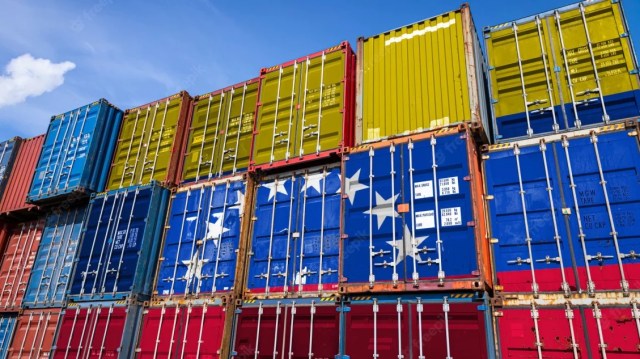
Rum and cocoa, but also shrimp, food, and even auto parts. The figures are still very low, but the private industry is exporting much more than in 2019 and 2020.
By Caracas Chronicles – Marianela Palacios
May 24, 2022
The trade flow from Venezuela to the United States hasn’t stopped, in spite of the sanctions. It even increased in 2021 and 2022, according to the Asociación Venezolana de Exportadores (Venezuelan Exporters’ Association; Avex) and the Cámara de Comercio Venezolana Americana (American-Venezuelan Chamber of Commerce; Venamcham).
In 2021, Venezuela exported products valued at 302 million dollars to the United States, an 80% increase or 134 million dollars over the 168 million dollars registered in 2020, according to Venamcham.
Total Venezuelan exports, including all destinations, not only the United States, reached 2,100 million dollars last year, much higher than the 1,450 million registered in 2020, when the pandemic hit hardest, said Ramón Goyo, president of Avex.
This year, exporters are hoping for an even better performance, given that in the first quarter of 2022 their shipments almost tripled, compared to 2021’s same period.
Avex’s numbers don’t include oil, gold, or junk metal exports. Those product lines are measured through other channels. Consulting firm Ecoanalítica, for example, estimates that oil exports will surpass 16,000 million dollars, almost three times of what came in during 2020 (5,714 million dollars).
You have to take into account that Avex and Venamcham are drawing their numbers from “mirror statistics”: in other words, those released by other countries based on imported products from Venezuela, because there isn’t official data available. Information by the Banco Central de Venezuela (BCV) on foreign trade has been missing since 2019.
However, in April, Vice President Delcy Rodríguez, assured that Venezuelan exports almost tripled during the first quarter of 2022, increasing 184% compared to the previous year. Her statement matches what Avex and Venamcham have claimed so far.
An Uneven Commercial Balance
Venezuela’s commercial balance continues to be dramatically uneven: the country imports almost ten times what it exports. But there’s good news in the midst of all the national economic chaos: after eight years of recession, which shrunk productivity by almost 80% between 2014 and 2021, exports no longer depend on oil by 95% like they did before.
The diversification of exports has deepened and the country has added value to many supply chains, and their non-traditional exports have been gaining ground. Venezuela is now shipping rum, gin, anise, wine, and cocuy; lobster, shrimp, tuna, prawn, crab, and fresh and frozen fish; seeds, oleaginous products, wafer cones, biscuits, artisanal and industrial chocolate; industrialized foodstuff for human and animal consumption; aluminum, steel, and plastic manufacturing; electric and automotive parts, among others.
“We’ve always exported those kinds of things, but in smaller quantities. You didn’t see many aluminum, chemical, and plastics exports, but the current market situation and functioning value chains made us able to take advantage of those opportunities and the private sector exports are now stronger,” Goyo claims.
Exports from Venezuela’s private sector mainly head to the United States, Latin America and Europe. But Asia is the main recipient of the exports from the public sector.
Made in Venezuela
The news in regards to rum exports? Reserve rums have multiplied and their prices go between 300 and 500 dollars.
“Shrimp production and exports are also expanding strongly. Production could easily grow 40% this year. There are large investments in Zulia, they’re going to increase from over 36 thousand tonnes to over 50 thousand tonnes,” Goyo says.
The Cámara de Fabricantes Venezolanos de Productos Automotores (Venezuelan Automotive Manufacturers Chamber; Favenpa), reported that last year, they doubled their shipping of car parts produced in the country compared to 2020, although it continues to be very low. Sales abroad in this industry were in the vicinity of 7 million dollars in 2021, “a very small amount when compared to 260 million from 14 years ago,” Omar Bautista, president of Favenpa, said to the Diario de Lara.
…
Read More: Caracas Chronicles – Venezuelan exports beyond the Devil’s excrement
…



